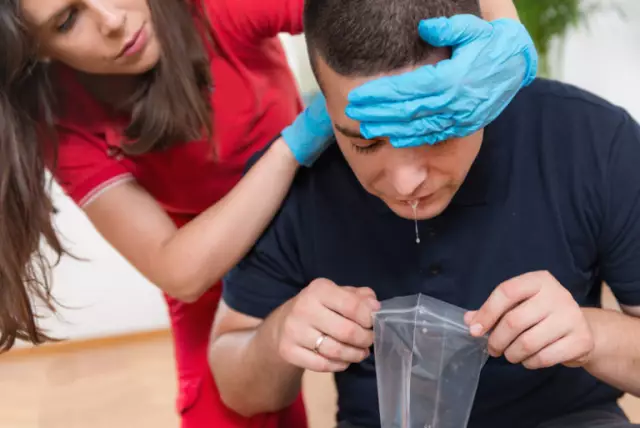- Author Rachel Wainwright wainwright@abchealthonline.com.
- Public 2023-12-15 07:39.
- Last modified 2025-11-02 20:14.
Pesticide poisoning
Pesticides are a large group of chemicals that have toxic properties and are used in crop production to combat plant pathogens, pests, parasites, and weeds. They are also used to destroy ectoparasites of humans and domestic animals.

Source: depositphotos.com
Pesticides, depending on the effect, are divided into the following groups:
- herbicides - to kill weeds;
- fungicides - have antifungal effect;
- insecticides - for the destruction of pests;
- zoocides - to combat harmful warm-blooded animals (for example, mice).
All pesticides are highly toxic, and if the rules for working with them are violated, a person can become poisoned.
How does pesticide poisoning happen?
Pesticides enter the human body through the digestive system with water or food, by inhalation (by inhaling the air contaminated by them), as well as through absorption through the skin and mucous membranes.
The mechanism of pesticide poisoning depends on which group of substances caused it. For example, when poisoning with organophosphate pesticides, the nervous system is predominantly affected. And pesticides based on arsenic compounds lead to the development of degenerative processes in muscle, renal, liver and nervous tissue.
Poisoning symptoms
The clinical manifestations of pesticide poisoning are determined, first of all, by the type of pesticide that caused the intoxication.
In case of poisoning with pesticides with insecticidal action containing organophosphates, the victim develops the following symptoms:
- muscle twitching, later turning into convulsions;
- psychomotor agitation;
- constriction of the pupils;
- disturbances of consciousness;
- labored breathing;
- a sharp decrease in blood pressure.
Chlorine-containing pesticides have a pronounced irritant effect, therefore the clinical picture of poisoning is different:
- sore throat;
- redness of the skin and visible mucous membranes;
- harsh cough;
- muscle weakness;
- severe lacrimation;
- disturbances of consciousness;
- jaundice;
- decreased urine output;
- swelling.
When poisoning with pesticides containing salts of heavy metals (copper, mercury, cadmium, arsenic), one of the first symptoms is the appearance of a strange taste in the mouth. Then the victim has:
- enlarged lymph nodes;
- stomach ache;
- nausea and vomiting;
- muscle weakness;
- headache;
- disturbances of consciousness;
- anemia.

Source: depositphotos.com
First aid for pesticide poisoning
In the case of pesticide poisoning, it is very important to start providing assistance as early as possible. First of all, it is necessary to stop contact of the poison with the body. In case of inhalation poisoning, the victim should be removed to fresh air. Rinse the skin with running water or a baking soda solution to remove pesticides from them and thereby prevent their further absorption.
If pesticides enter the human body through the mouth, you need to rinse the stomach by giving the victim about a liter of water to drink, and then induce vomiting. This procedure is prohibited in young children and in unconscious victims, as it can lead to aspiration of vomit and the development of Mendelssohn's syndrome. In such cases, gastric lavage is performed already in the hospital by medical personnel using a gastric tube.
After washing the stomach, the victim should be given enveloping agents (Almagel, Phosphalugel, milk with egg yolk, jelly) or sorbents (Polyphepan, Activated carbon, Smecta).
When is medical attention needed?
In case of poisoning with pesticides, the victim should be immediately, immediately after the provision of first aid, taken to the toxicology department. Medical assistance is needed in 100% of cases.
After the poisonous substance that caused the poisoning has been determined, the patient is injected with a specific antidote. For example, in case of poisoning with organophosphate pesticides, Atropine sulfate is prescribed, and in case of intoxication with heavy metals - Unithiol.
Depending on the specific clinical situation, various methods of extracorporeal detoxification are also used (forced diuresis, peritoneal dialysis, plasmapheresis, hemodialysis or hemosorption). Further therapy is symptomatic.
Possible complications
The prognosis for pesticide poisoning is always serious. These substances cause damage to almost all organs, which can lead to the development of pneumonia, myocarditis, acute renal and hepatic failure. In severe poisoning, death is possible.
The long-term consequences of pesticide poisoning can be the development of chronic renal or hepatic failure, the formation of a pronounced asthenovegetative syndrome.
Prevention
When working with pesticides, you must carefully follow the safety rules. Carry out work using personal protective equipment (goggles, mask or respirator, long-sleeved clothing, rubber gloves). After finishing work, take off protective clothing and shower immediately.
Pesticides are stored out of the reach of children, with mandatory labeling on the packaging warning of the high toxicity of the substance.
YouTube video related to the article:

Elena Minkina Doctor anesthesiologist-resuscitator About the author
Education: graduated from the Tashkent State Medical Institute, specializing in general medicine in 1991. Repeatedly passed refresher courses.
Work experience: anesthesiologist-resuscitator of the city maternity complex, resuscitator of the hemodialysis department.
The information is generalized and provided for informational purposes only. At the first sign of illness, see your doctor. Self-medication is hazardous to health!






